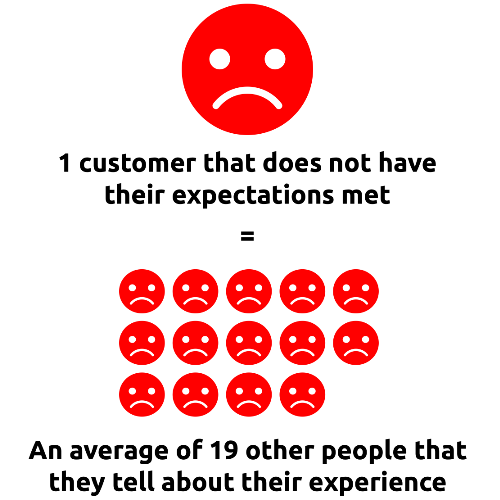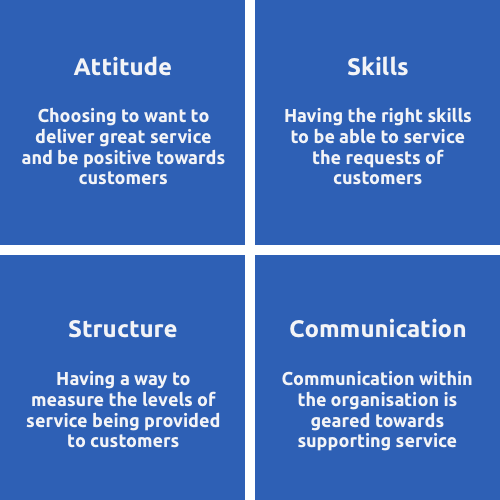The Importance of Customer Service
Does your organisation understand the importance of customer service? You have probably heard the term that “the customer is always right”. While many people disagree with this statement, it is probably true. This largely depends on the way in which you look at the statement.
The customer is always right in that they are the lifeblood of any organisation. Our role as those who provide customer service is to recognise that our customer has expectations and, in their mind, their expectations can and should be met. We need to understand what those expectations are and meet them as closely as possible. If we don’t, the customer will feel as though the service they received is sub-standard, which then forms their opinion of our business.

This was well before the days of social media, reviews platforms and other digital communication. Today, if you do not meet a customer’s needs, the amount of people that can be influenced by one person’s opinion is endless.

Net Promoter Score
A common way that organisations measure the service that the customer has received is to use a metric called Net Promoter Score (NPS). To get the net promotor score and organisation will ask a single question to their customer – this is usually “on a scale of 1-10, where 1 is not likely and 10 is very likely, how likely are you to recommend our company to others”.
Rather than ask them about their experience, the questions ask if they would tell others about your business. The scores work as follows:
- A score of 1-6 – these people are known as detractors. they will not recommend you. They will either say nothing or will share their experience with other people
- A score of 7-8 – these people are known as passives or neutrals. They will neither tell nor not tell about their experience
- A score of 9 or 10 – these people are known as promoters are likely to share their positive views of your organisation and the service they received
Again, this highlights the importance of customer service in that we only have a small opportunity to generate promoters of our business. Anything less than a 9, our customers don’t share the good word.
The score is calculated by subtracting the percentage of detractors from the percentage of promoters and turning this into an integer (a number rather than a percentage). For example, if you had 60% of people as promoters and 10% of people as detractors, your net promoter score would be 50% or 5.0 as an integer.
The Benefits of Delivering Good Customer Service
When we understand the importance of customer service, we understand that good service brings many benefits. Some of the benefits of delivering good customer service are:
- Loyal customers
- Repeat business
- More word of mouth referrals
- Less time spent dealing with complaints
- Happier staff
- More time to spend further improving service and the proposition offered to customers
- Increased revenue and profits
- Business growth
The Four Elements of Customer Service
When it comes to customer service there are four main elements that when considered altogether will ensure that a business is delivering effective customer service. These elements are:

Attitudes
People in the business need a can-do attitude. They should understand the importance of customer service and be there to help customers, promote the business and ensure that the customer is placed at the centre of everything. This should happen regardless of pressure from targets and goals, and even if the customer-facing team are feeling pressure from above to achieve more, this should never come across when dealing with customers.
We all have the ability to separate the emotions we are feeling from the outward attitude we demonstrate. This is an easy thing to do in theory, but really difficult in practice. See this post for more on this.
Customers themselves can also drive people to feel negative, but we need to understand that they are always right and we should do everything we can to help them, especially in these challenging times. See our Why Customers Are Always Right post for more details.
Skills
In order to deliver effective customer service, those people facing customers need a certain amount of skills to ensure that customers are receiving great service. Some of the skills include communication skills, listening skills, assertiveness skills, questioning skills and being empathetic.
If your organisation doesn’t seem to be delivering the right level of service to customers or you are receiving lots of complaints, then maybe it is time to look at the skills levels of the customer-facing people to see if they have the right skills set. If they haven’t, then this could be having a negative impact on their attitude towards the business and of course customers.
Structure
Your organisation should have a way of measuring service standards. They should understand the importance of customer service and therefore build measures around how well the organisation is delivering service.
These should be documented and communicated to the customer-facing people in the business. These don’t have to be detailed standards, more of a framework that shows the organisation’s approach to delivering effective customer service.
If the customer-facing people in the business don’t know what is expected of them or the importance of customer service to the business, how will they ever achieve the expectations the business or the customer has of them.
Regular reviews of standards should be carried out to check they are still relevant, and customer service standards should be included in one to one discussions.
Communication
This is twofold. As mentioned previously the organisation should communicate their expectations to the customer-facing staff on a regular basis. We need to remind our people of the importance of customers and the importance of customer service.
Also, the communication approach that the team takes with customers is important. We not only need to be highly aware of the attitude we have towards customers but also highly aware of the style of communication that we use with customers.
Thought should be given to first impressions, body language, our voice and the actual words that we use.
Ensuring all of the above four elements are looked at and are correct, will go some way to ensuring that the service you offer to customers is highly effective.
The Right Customer Service Behaviours
Next comes behaviours then skills. Behaviours are the things that customers see and hear and should show that we understand the importance of customer service. Skills are the things we need to learn and practice to deliver a better service.
Here are some top tips linked to the above to help you to improve your service:
- Be Quick and Accurate: Some customers like to spend time chatting with you. Others just want you to be brief and bright. No one likes service that takes too long. Be efficient but friendly. Use questions to engage with your customer, but make sure you continue to service the request. With speed comes mistakes. Be sure to concentrate on what you’re doing to make sure you get things right. Get something wrong, your speedy actions may lead to a longer problem to solve.
- Be Empathetic: Telling a customer ‘you understand how they feel’ isn’t being empathetic. It’s fake and it’s patronising. Instead, take some time to listen to your customer’s issue. If they are stuck, take time to understand what they want. Be patient, listen and respectful. Being empathetic is about understanding the customer’s situation, not trying to feel like they do.
- Follow Up: If you say you are going to do something – do it. If you say you’ll get back to them – do it. One of the biggest annoyances for customers is being let down. Be specific. Ditch the ‘I’ll get back to you ASAP’. Instead, provide specific times. Don’t promise it will be fixed in that time scale. Instead, tell them you’ll provide an update in that time scale.
- Take Responsibility: If you make a mistake then own up to it. Passing the buck can cause more problems than it’s worth. Customers want to feel that someone has ownership for their problem, concern or issue. Use ‘I’ statements and not ‘we’ statements.
- It’s About the Customer: It’s not about money. Sure, customers bring the money in, but if there are no customers, there is no revenue. By being customer-centric and not revenue centric you’ll keep them coming back. Look at it this way:
Happy Staff = Happy Customers = Healthy Revenue = Healthy Business = Happy Staff = Happy Customers (and so on and so on).
Cutting corners, not taking time, rushing, making mistakes and not taking responsibility will drive customers away. We need all of the people in the organisation (whether customer-facing or not) to understand the importance of customer service and the positive impact it can have.
Customer Service Training Course
At Revolution Learning and Development we offer a one-day Customer Service Skills Training course that looks at the importance of customer service and the four elements above in much more detail.




